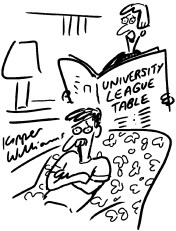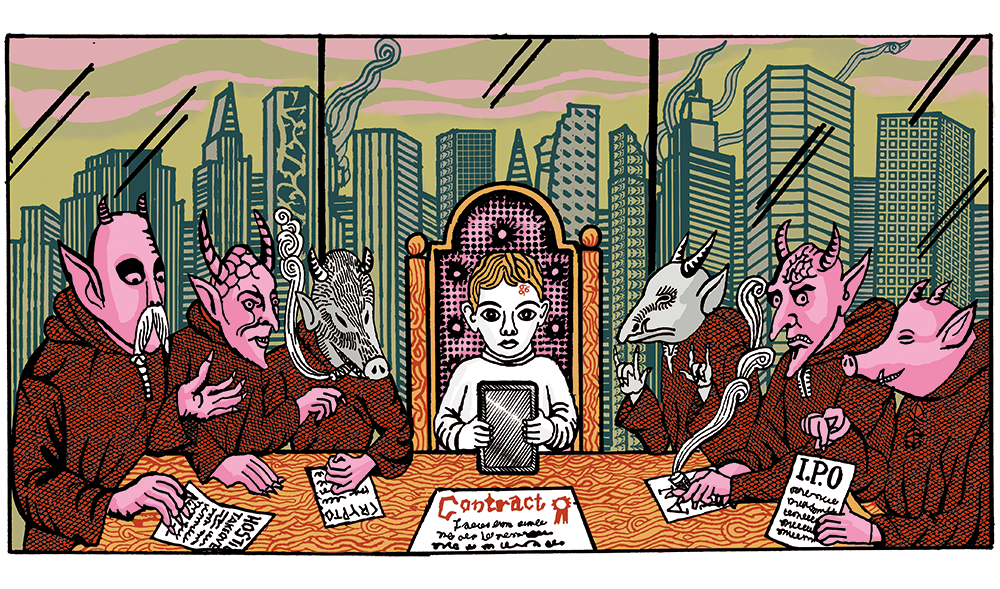
The monster known as the Antichrist has been stalking Christians for nearly 2,000 years. Mostly it has fed the nightmares of frightened peasants or credulous fundamentalists. But now it has emerged from the most secular place on Earth, Silicon Valley, and its prophet is a billionaire venture capitalist married to a man.
The origins of the Antichrist legend lie in the Book of Revelation, in which the nations submit to a Beast whose name is concealed by the number 666. He forces everyone to receive a mysterious ‘mark on their right hands or foreheads’ without which they cannot buy or sell anything. This triggers the return of Jesus at the Battle of Armageddon. Early Christians seized on the ambiguous term ‘antichrist’, a word found in the Epistles of John, used in the plural to refer to heretics in general, and combined it with the Beast. Enter the demonic supervillain known as the Antichrist – a Satanic demagogue so seductive that he conquers the world and, in more recent interpretations, uses his implanted mark to usher in one-world government.
Down the centuries, every generation of Christians has played the game of identifying a real-life enemy as the Antichrist. Its champions have included itinerant barefoot friars, witch-hunting Puritans and perma-tanned televangelists. The list of unmasked Antichrists is impressive: Mohammed, innumerable popes, Martin Luther, King George III, Adolf Hitler, Henry Kissinger and Bill Gates. The founder of Microsoft qualifies twice over: he introduced the computer software that will enable the Beast to terrorise the faithful, and then he circulated vaccines – a mark on the hand! – to manipulate their DNA.
Prophecies of the Antichrist have always had a paradoxical relationship with technology. They were spread by new means of transport and went viral after the inventions of printing, moving pictures and the internet. At the same time, every innovation created fresh possibilities for the End Times tyranny of Satan.
How bizarre, then, that today’s most influential proponent of the Antichrist thesis should be Peter Thiel, who at first glance is a poster boy for the sinister global elite. He ticks nearly every box. He’s a handsome, silver-tongued homosexual who qualified as a lawyer at Stanford University, became unimaginably rich as a trader and investor, belongs to the Bilderberg Group, fantasises about sea and space colonies, and flirts with a transhumanist ideology that seeks to abolish physical death. And how did Thiel become a billionaire? By co-founding PayPal. Remember what Revelation says about the Beast seizing control of buying and selling?
Yet, in reality, what Thiel actually represents is the surreal reconfiguration of politics in the 21st century. As he reclines in his Gulfstream jet en route from Los Angeles to his mansion in Hawaii, he dreams of the downfall of a globe-trotting liberal elite who he believes are using their billions to manufacture a new world order. He calls them ‘the Antichrist’. Like many American fundamentalists, he worries that dark forces are using supranational institutions such as the United Nations to control the world. He has become a citizen of New Zealand and has bought land there as insurance against nuclear Armageddon.
Thiel may be reviving a toxic conspiracy theory, but ‘the philosopher king of Silicon Valley’, as he’s been called, is a disciple of Carl Schmitt and René Girard and his prophecies are expensively tailored. In June, his vision of Antichrist was the subject of a chin-stroking discussion between Thiel and Ross Douthat on the latter’s New York Times podcast.
Thiel does not play the game of naming a contemporary figure as the Antichrist. Instead he separates the two components of the legend – supervillain and global tyranny. He doesn’t think that the nations will grovel before the Beast disguised as a charismatic saviour. But, as he told Douthat, he does think we are sliding towards ‘a one-world government to control all the computers, log every single keystroke, to make sure people don’t program a dangerous AI’.
The list of unmasked Antichrists is impressive: Mohammed, Martin Luther, Bill Gates, multiple popes
The fear of a catastrophe generated by artificial intelligence is reasonable. In contrast, the prospect of one-world government is hardly more credible than the anxiety of Reagan-era fundamentalists that the Beast would use supermarket barcodes to enforce a new world order. In Thiel’s musings, the clever and the silly are inextricable. He makes the excellent point that China’s relative lack of progress in AI may prompt it to seize Taiwan ‘because they know it’s now or never’. But his perception of the arc of history is as full of holes as Hal Lindsey’s The Late Great Planet Earth. That book, the bestselling non-fiction title of the 1970s, argued that the Bible prophesied the Six-Day War, the rise of the Common Market, nuclear weapons and ‘a sophisticated computer system’ to run a cashless economy. (There is no mention of PayPal, since Thiel was only three years old when it was published.)
Thiel’s model of history celebrates the first moon landing as the last ‘accelerationist’ step towards a techno-utopia before risk-averse peaceniks plunged us into stagnation. He tells Douthat: ‘We landed on the moon in July of 1969, Woodstock started three weeks later and, with the benefit of hindsight, that’s when progress stopped and the hippies won.’ According to Thiel, the fantasies of those hippies then infused international bodies; they propagated a militant environmentalism, epitomised by his bête noire Greta Thunberg, that has become the only meaningful ideology in the West.

There’s some truth in this, but paradoxically Thiel underplays the role of Silicon Valley technology in undermining progressive orthodoxies, to the point where liberal agents of what he calls the Antichrist are resorting to attacks on free speech, especially in universities, that provoke a further backlash.
The consensus around net zero is crumbling fast; the scowling, self-important Greta is a laughing stock. Meanwhile, on the world stage formerly sacrosanct global bodies have lost credibility; in an interview published last week Pope Leo XIV said that the United Nations ‘has lost its ability to bring people together on multilateral issues’. Fewer people trust the World Health Organisation, now deeply infiltrated by the Chinese government responsible for the outbreak of Covid-19.
During the pandemic, nation states retreated into themselves; when they emerged they were notably less internationalist. The debate about Britain rejoining the European Union has fizzled out as pro-EU politicians realise, even if they won’t admit, that it can’t survive in its present form. Meanwhile, the deaths of perhaps 250,000 people in Ukraine, to say nothing of China’s quasi-imperial ambitions, suggest that, far from submitting to the diktats of Davos, we are returning to Great Power politics. One-world government? Good luck with that. If anything, it is the other element of the Antichrist legend, the messianic pseudo-saviour, that seems more relevant – but in an era of resurgent nationalism his or her appeal is by definition limited by geography.
In reality, what Peter Thiel represents is the surreal reconfiguration of politics in the 21st century
For all these reasons Thiel, on occasion an exhilarating source of ideas, should not be attempting to disinter the Antichrist. But there is an even more insidious danger lurking at the bottom of his favourite rabbit hole.
Since the last days of the Roman Empire, fear of the Beast has spawned crazy and destructive conspiracy theories. The long-overdue rejection of woke ideology, reflected in American public support for the mould-breaking initiatives of Trump 2.0, has begun to metastasise. Much of the mythology of the Antichrist assumes that he will be a Jew or an agent of the Jews. Although Thiel is not an anti-Semite, he could hardly have picked a worse time to be talking about one-world totalitarianism directed by a secretive elite. The online right, outraged by Israel’s pursuit of the war against Hamas, and borrowing tropes from the anti-Semitic left, is convulsed with Jew-hatred. And this obsession is becoming more pathological every day.
We live in a period of ideological chaos in which conspiracy theories cross-pollinate with a new intensity. The philosopher king of Silicon Valley is unintentionally pointing us towards new killing fields. And if you doubt that, try googling ‘Charlie Kirk’ and ‘Antichrist’.
Why is Silicon Valley so obsessed with the ‘Antichrist’? Damian Thompson discusses further on the Edition podcast:









Comments